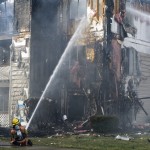Five Fire Damage Prevention Tips
 Wednesday, April 8, 2009 at 03:40PM
Wednesday, April 8, 2009 at 03:40PM  Fire damage can cripple small businesses, a fact that many business owners don't consider until disaster strikes. According to the popular cliché, hindsight is always 20/20. After a disaster, it's easy to see where careful planning and preparation could have prevented damage. To help you prepare for the worst, here are ten tips to help improve your fire prevention foresight.
Fire damage can cripple small businesses, a fact that many business owners don't consider until disaster strikes. According to the popular cliché, hindsight is always 20/20. After a disaster, it's easy to see where careful planning and preparation could have prevented damage. To help you prepare for the worst, here are ten tips to help improve your fire prevention foresight.
1. Damage Due to Flames and Smoke.
The damage fire causes is typically two-fold. Obviously, flames consume everything they touch, reducing objects to ash and corrupting the integrity of larger structures. Smoke is attracted to cool areas and rises, so it travels through vents, plumbing, and any other openings. Smoke causes two main problems: soot stain and odor. Things like carpet and upholstery trap and absorb the horrible odor, and it's very difficult to completely rid furniture, computers, art, and walls of the lingering stench. Additionally, toxic chemicals can be produced when safe materials are combined and heated by fire. Part of your recovery plan should include a screen for toxic chemicals before any form of fire restoration is attempted.
2. Common Fire Starters.
The two most common sources of a fire in a workplace are easy to avoid. First, do not keep candles at the workplace. These are notorious fire starters. Second, don't overload the electrical outlines in the building. Use surge protectors and multiple outlines to avoid creating a fire hazard.
3. Fire Insurance.
Fire insurance is a must. Most property insurance policies cover loss in the event of fire but often not enough to cover all damages. Know what your policy covers, and always insure for 100% of the business value. Make a point to review your policy annually, and use an independent appraiser to assess the company's value each year. If you need to, add supplemental fire coverage to your policy. Never settle for partial coverage just to pay lower premiums because if you ever do fall victim to fire damage, you'll be incredibly sorry. Also note that certain valuables and documents will not be covered under the property policy, so you'll need to insure these items individually. If you're particularly concerned, make a video of the building, property, and valuables in the event you'll have to dispute any claims for losses. Additionally, if your business is located in an older facility, consider adding coverage for rebuilding according to current codes.
4. Fire Damage Recovery.
In the event of a small business disaster, like a fire, it's important to have a disaster recovery plan. Typically, this is a formally drafted plan detailing the steps taken after the occurrence of a disaster. These plans usually include detailed contact information for employees, clients, and vendors; alternative methods and locations for conducting business; and any critical resources to be recovered.
5. Hire a Professional Recovery Specialist.
In the event of a fire, companies should work closely with a disaster recovery service before and after the fire. No matter how sharp your foresight, disasters like fires pose unexpected problems and complex challenges. Hiring a disaster recovery specialist ensures that you're the recovery process will be efficient and thorough, and that your company will be back in business in no time.
~Richard McNeal, 2009 Article Source:http://www.articlesnatch.com


Reader Comments